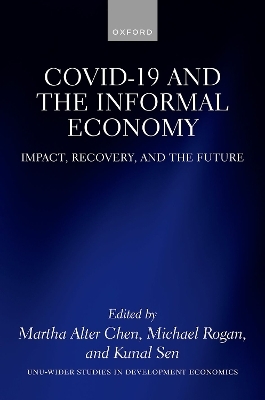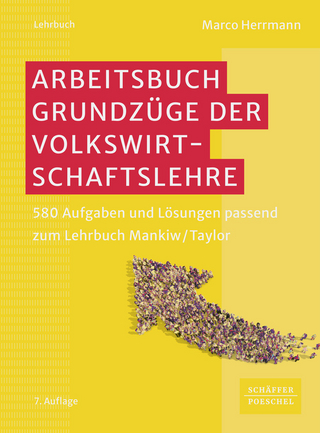
COVID-19 and the Informal Economy
Oxford University Press (Verlag)
978-0-19-888704-1 (ISBN)
This is an open access title available under the terms of a CC BY-NC-SA 3.0 IGO licence. It is free to read at Oxford Scholarship Online and offered as a free PDF download from OUP and selected open access locations.
A key challenge for the post-COVID global economy is whether the disproportionate impact of the crisis on informal workers, who form the majority of the world's workforce, will be acknowledged. Or whether harmful and negative stereotypes will persist.
Today, despite the role of these essential frontline workers - producing, processing, selling, cooking and delivering food, providing cleaning, childcare, eldercare, healthcare, transport, waste removal, and other essential services - many observers consider the informal economy to be non-compliant (resisting registration and taxation) and associate it with low productivity (a drag on the economy) or with crime (illegal activities) and grime (blight on modern cities). Yet, most informal workers are working poor trying to earn an honest living in often hostile environments. Most suffered severe declines in work and earnings during successive waves of the COVID pandemic, and related restrictions and recessions, and have gone deeper into debt and depleted their savings and assets in order to survive.
This book explores and informs answers to that key challenge. It presents findings on the impact of the COVID crisis on informal workers in Asia, Africa, and North and Latin America. The chapters of the volume analyse the impact of the COVID crisis on informal workers, interrogate whether and which economic recovery plans and schemes include informal workers, and explore what a more inclusive economic recovery and reforms might look like.
Martha (Marty) Chen is a Lecturer in Urban Planning and Design at the Harvard Graduate School of Design and Co-Founder, International Coordinator Emeritus and board member of the global network Women in Informal Employment: Globalizing and Organizing (WIEGO). An experienced development practitioner and scholar, her areas of specialization are employment, gender, and poverty with a focus on the informal economy. Before joining Harvard in 1987, she had two decades of resident experience working in Bangladesh (with the NGO BRAC) and in India (as field representative of Oxfam America). Currently, she is chair of the boards of BRAC Global and the United Nations University World Institute for Development Economics Research (UNU WIDER). Michael Rogan is an Associate Professor in the Department of Economics and Economic History as well as the Neil Aggett Labour Studies Unit (NALSU), both at Rhodes University in South Africa. Since 2011, he has been a research associate in the global research-policy-action network Women in Informal Employment: Globalizing and Organizing (WIEGO). He has published widely on topics such as informal employment, gender, poverty, food security, education, and skills development. His focus is largely on developing and middle-income countries where he has worked with various government departments, non-profit organisations, and national statistics offices. Kunal Sen is Director of UNU-WIDER, Helsinki, Finland, and Professor of Development Economics, Global Development Institute, University of Manchester, UK (on leave). He has over three decades of experience in academic and applied development economics research. He has performed extensive research on the political economy of growth and development, international finance, the dynamics of poverty, social exclusion, female labour force participation, and the informal sector in developing economies. His research has focused on India, East Asia, and sub-Saharan Africa. He was awarded the Sanjaya Lall Prize in 2006 and the Dudley Seers Prize in 2003 for his publications.
1: Martha Alter Chen, Erofili Grapsa, Ghida Ismail, Sarah Orleans Reed, Michael Rogan, and Marcela Valdivia: COVID-19 and informal work: Degrees and pathways of impact in eleven cities around the world
2: Martha Alter Chen and Joann Vanek: The impact of the COVID-19 pandemic on employment: Findings from national labour surveys in five Latin American countries
3: Michael Danquah, Robert Osei, Simone Schotte, and Kunal Sen: The impact of COVID-19 on employment and earnings in Ghana
4: Michael Rogan and Caroline Skinner: South Africa's informal economy and COVID-19: Differentiated impacts and an uneven recovery
5: Simone Schotte and Rocco Zizzamia: The impact of COVID-19 on urban vulnerable livelihoods: Accounts from residents of Cape Town's largest township
6: Hossain Zillur Rahman, Atiya Rahman, Md Saiful Islam, Avinno Faruk, Imran Matin, Mohammad Abdul Wazed, and Umama Zillur: Recovery with distress: Unpacking COVID-19 impact on livelihoods and poverty in rural areas and urban low-income settlements of Bangladesh
7: Deepita Chakravarty and Nandini Nayak: The COVID-19 pandemic and intra-household bargaining: A case of domestic workers in Delhi
8: Michael Danquah, Amina Ebrahim and Maureen Were: The uneven path to recovery: The sub-Saharan African experience
9: Siviwe Mhlana, Rachel Moussié, Sally Roever and Michael Rogan: Informal employment and an inclusive recovery: What is missing from national economic recovery plans?,
10: Laura Alfers and Florian Juergens-Grant: Social protection, the COVID-19 crisis and the informal economy: Lessons from relief for comprehensive social protection
11: Martha Alter Chen, Sophie Plagerson and Laura Alfers: A new social contract inclusive of informal workers
12: Ravi Kanbur, Jayati Ghosh, Barbara Harriss-White, and Jan Breman: Reflections on informal employment, COVID-19 and the future
| Erscheinungsdatum | 09.05.2024 |
|---|---|
| Verlagsort | Oxford |
| Sprache | englisch |
| Maße | 165 x 240 mm |
| Gewicht | 722 g |
| Themenwelt | Wirtschaft ► Volkswirtschaftslehre ► Makroökonomie |
| ISBN-10 | 0-19-888704-3 / 0198887043 |
| ISBN-13 | 978-0-19-888704-1 / 9780198887041 |
| Zustand | Neuware |
| Informationen gemäß Produktsicherheitsverordnung (GPSR) | |
| Haben Sie eine Frage zum Produkt? |
aus dem Bereich


